by Natalie Hanson
June 12
At a time when hate-fueled speech, crime and violence are threatening marginalized communities nationwide, it often falls on grassroots community movements to create change and promote healing from injustice, experts say.
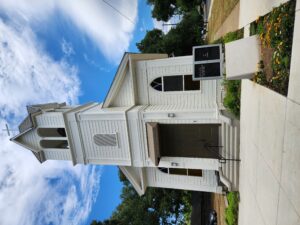
Chico has tragically faced numerous incidents of hate against people who have historically faced discrimination. The city’s oldest Black church, Bethel African Methodist Episcopalian Church (AME), has reported repeated vandalism since 2020. Art by indigenous organizers has been vandalized. Unhoused people face ongoing verbal harassment and death threats. Anti-Semetic flyers have been delivered to homes across the city several times this year. Stonewall Alliance Chico says it is aware of growing fears of harassment, particularly among LGBTQ youth who face calls for public schools to repeal codes protecting their privacy to avoid discrimination.
Bethel AME is the home of the family of Desmond Phillips, fatally shot by Chico police in 2017. His family’s claims for damages were blocked by a conservative federal judge who granted the city’s request for a “summary judgment” in its entirety, dismissing all nine damage claims made by the plaintiffs -– sparking widespread local outcry. Since then, in 2020 the church was vandalized multiple times -– coinciding with the violent death of George Floyd in Minnesota at police officers’ hands.
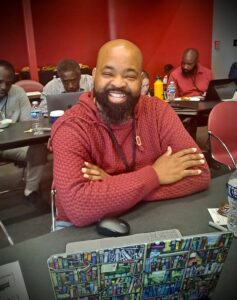
Pastor Robert Morton told ChicoSol this week that in the last several months, the church has experienced more vandalism and “cryptic messages,” causing fear among his mixed congregation.
“Black, White, Hispanic, Hmong, young, old -– you name it, it’s in our church community,” Morton said.
To him, that’s an opportunity for cross-cultural communication. The church has been hosting workshops to teach Black history and held a clinic to support people during COVID.
“We’ve done those things intentionally to attempt to tear down those walls,” he said.
“Yet, we’ve still run into these incidents when it comes to issues of racial fear-mongering. When you’re coming to our church and you’re defecating on our property and smearing blood on our doors, we take that as provocation. It’s clear to us, based off the messages we’ve gotten, that these things are centered on us being a Black church, where Black folks congregate.”
Morton said he has been impressed with how local activists like David Phillips turn their pain into tangible community work for change even more so than local policymakers. Phillips has organized at City Council meetings to demand reform and accountability for Chico Police Department and been active in providing food for unhoused people.
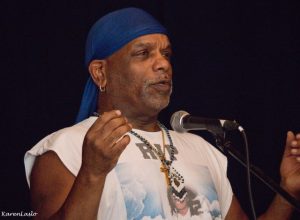
“I do not put any stock in local politicians bringing voice to our concerns,” Morton said. “I have not seen it happen, and I don’t expect for it to occur.”
Morton said he wishes that the broader community would participate in discussing local reparations, and understand how systemic racism has impacted Black residents as well as other people of color.
Those who research hate speech say that communities may seek such healing within their own spaces, but also want more than lip service for the trauma they face.
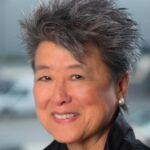
Helen Zia, author and founder of The Vincent Chin Institute, said in an Ethnic Media Services panel that the “epidemic of hate” against Asian-Americans, which resurged during COVID, is a recurring one. In 1982, hatred of Japanese-Americans was surging and two men in Detroit ultimately beat a local man, Vincent Chin, to death with a baseball bat. A judge sentenced them to probation.
Zia said the tragedy drove locals outraged at the lack of justice to organize and demand change to prevent more deaths stemming from racism. Today, hate crimes against Asians have increased on every continent since 2019.
“Even though for some it was new, for others it was triggering,” she said. “Intergenerational trauma goes beyond direct violence. As long as the rhetoric goes on about China being an existential threat to Americans, we know these hateful acts and violence are going to continue.”
Nestor Fantini, publisher and sociologist, shared his experience as a former political prisoner in Argentina during the 1976 coup d’état that overthrew President Isabel Perón. The right-wing authoritarian regime that imprisoned and murdered many Argentines was supported by the Ford Administration and U.S. Secretary of State Henry Kissinger.
Fantini said that people who came to America fleeing war and death still live with those traumas while often facing discrimination in their new home.
While he said he supports reconciliation as solidarity between marginalized communities, he said there also must be restorative justice programs with tangible results. For example, Argentinians received material reparations and an apology from the National Congress.
But such reparations are late for others. James Taylor, professor of African American History at the University of San Francisco, pointed to the San Francisco Reparations Advisory Committee and the state’s reparations committee still pushing for reparations to rebuild Black Americans’ futures.
Reparations is about “healing and reconciliation” — Professor James Tayor
Taylor said that policies that only pay lip service without substantial change are “piecemeal, to stall reparations.” He quoted Martin Luther King, Jr., who said in his famed “I Have a Dream” speech, “In a sense we have come to our Nation’s Capital to cash a check.”
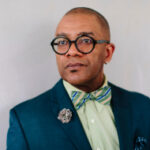
“What reparations is about, is healing and reconciliation and fixing the broken bone to repair a people,” Taylor said.
Added Taylor: “Anyone that emphasizes the money, I think, is really distracted by it as an idea. It’s not just about the money. Time has really exposed that no matter what else has happened, this issue of economic reparations continues to come back. It’s haunting America.”
For his part, Morton said he sees positive change working with United Way of Northern California, which has an equity fund designed to support projects uplifting marginalized communities. He also complimented Oroville’s Southside Community Center led by Pastor Kevin Thompson for dedicating funds and work to tackling food and housing insecurity.
As for Bethel AME, Morton said that despite the racism it has experienced, “We’re not going anywhere.
“We’re not going to be pushed out, and we’re not going to operate by fear. We got to operate in love. We try to give and do acts of kindness in our community. It’s absolutely hard work, but it is necessary work.”
Natalie Hanson is a contributing writer to ChicoSol.

Thank you so much Natalie for this very inspiring article!
Well done article. These issues are a call to action. A call to logic, ethics, and our spiritual wisdom to find common ground and heal the hate.
Thanks Natalie,
Would have loved to see Concerned Community for Justice (CCFJ) in this article… They have been addressing these issues for Quite a while.
While living there, I often found a kind of indifference from many people and looking deeper, a kind of disassociation with the isues… as I understand it, the bottom layer of that to be Fear.
Great information…hope the next piece can be what the Mothers for Liberty (now a designated Terrorist group) are trying to do to our public schools, especially around Trans students and their parents. They’re trying to usurp the CA Dept. of Education’s section on Student Equity.
Natalie, thank you for continuing to cover these important issues in our community and your home town. I started a local AAPI support group after experiencing a misinformed comment made by an elder white man when receiving our covid vaccinations and after Asian spa workers were killed. Local Asian American Pacific Islander community members are invited to join us.